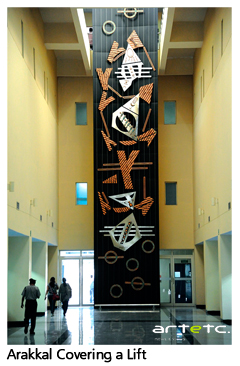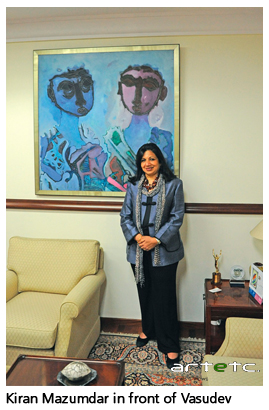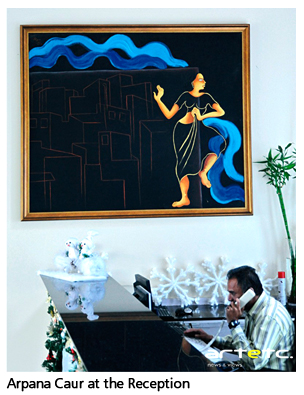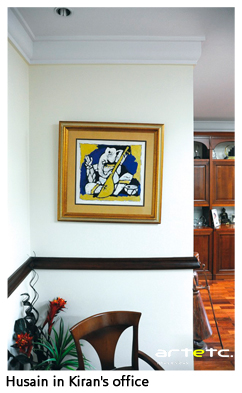- Publisher's Note
- Editorial
- The Enigma That was Souza
- Progressive Art Group Show: The Moderns
- The Souza Magic
- M.F. Husain: Other Identities
- From All, One; And From One, All
- Tyeb Mehta
- Akbar Padamsee: The Shastra of Art
- Sensuous Preoccupations of V.S. Gaitonde
- Manishi Dey: The Elusive Bohemian
- Krishen Khanna: The Fauvist Progressive
- Ram Kumar: Artistic Intensity of an Ascetic
- The Unspoken Histories and Fragment: Bal Chhabda
- P. A. G. and the Role of the Critics
- Group 1890: An Antidote for the Progressives?
- The Subversive Modernist: K.K.Hebbar
- Challenging Conventional Perceptions of African Art
- 40 Striking Indian Sculptures at Peabody Essex Museum
- Tibetan Narrative Paintings at Rubin Museum
- Two New Galleries for the Art of Asia opens at the Museum of Fine Arts in Boston
- Raphael, Botticelli and Titian at the National Gallery of Australia
- The Economics of Patronization
- And Then There Was Zhang and Qi
- What Happened and What's Forthcoming
- Random Strokes
- Yinka Shonibare: Lavishly Clothing the Somber History
- A Majestic “Africa”: El Anatsui's Wall Hangings
- The Idea of Art, Participation and Change in Pistoletto’s Work
- On Wings of Sculpted Fantasies
- The Odysseus Journey into Time in the Form of Art
- On Confirming the Aesthetic of Spectacle: Vidya Kamat at the Guild Mumbai
- Dhiraj Choudhury: Artist in Platinum Mode
- Emerging from the Womb of Consciousness
- Gary Hume - The Indifferent Owl at the White Cube, London
- Daum Nancy: A Brief History
- Experimenting with New Spatial Concepts – The Serpentine Gallery Pavilion Project
- A Rare Joie De Vivre!
- Art Events Kolkata-December 2011– January 2012
- Art Bengaluru
- Mumbai Art Sighting
- Delhi Dias
- Musings from Chennai
- Preview, February, 2012- March, 2012
- In the News-January 2012
ART news & views
A Rare Joie De Vivre!
Issue No: 25 Month: 2 Year: 2012
Corporate Corner
by Franck Barthelemy
An entrepreneur, a philanthropist, a leader, a writer, a food lover, a keen traveller, a city of Bangalore champion and an art collector, Kiran Mazumdar-Shaw is a multifaceted and multitalented lady. When she is not travelling for her business, she does for her pleasure and gets excited with novelties.
Kiran welcomed me in her Biocon's office in Bangalore, at the heart of pharmaceutical empire that she built from scratch. The room is large, full of light. A mahogany wood book case behind her desk makes it look warm. Carpets on the floor bring up that delicate feeling that we might be at home. Kiran, often caught between two flights, had just come back from Paris where she spent Christmas with family and friends. She shared with me the amazing culinary experiences she had there. She visited two 3 star Michelin restaurants and few food boots on Christmas markets, not far from the Champs Elysées or in the tiny city of Dijon. She enjoyed every single minute. And I am not surprised. This is the peak season. The chefs, sous-chefs and amateur cooks are hunting the markets for the best ingredients to offer to their guests and friends. The sommeliers are looking for the best bottles of wine and champagne to match the Christmas preparations. A chilled Pouligny-Montrachet with a 10 second panned fresh foie-gras déglacé with a vintage balsamic vinegar is unforgettable ! As unforgettable as a nature-morte by one of the 18th century's masters.

I first thought Kiran's joie de vivre and curiosity would be limited to food and wine. But it was absolutely not so! They are inherent features of her personality. I could find them throughout our discussion. She is passionate about life. Generally speaking, she is passionate about anything creative, whether it is business, science or art. In any of these fields, one can express in a very original way. 'Original expression appeals to me', she said as an introduction.
 Kiran is an avid art collector. She built her Biocon's collection over the last two decades. Both collection exceed 800 art works as per a very precise inventory she keeps on her computer. Following her motto, she is looking for creativity and a certain sense of aestheticism. As a business leader, she believes that working in a quality environment can only improve her and her colleagues' efficiency. In her mind, art is very much part of the environment. So she does not hesitate to share her collection in the Biocon's premises. Beyond her office, where she keeps the works by SG Vasudev (one of her favourite she said), MF Husain or Anjali Ela-Menon, she personally placed many paintings and sculptures on almost every wall of the company: meeting rooms, offices, corridors, dining rooms, receptions. She not only creates a nice work place but she also tries to arise her colleagues' curiosity, a skill that every manager should have. Her displayed collection at Biocon aim to 'create a quest for curiosity', she admitted. Even though some, maybe most, might not understand art and take it for granted, and just as a part of the decoration, it does not matter. Art appreciation will come with time. 'Colleagues will appreciate' and she is thinking about creating some art appreciation trail for those who are interested. I personally believe it is a brilliant idea and I am looking forward to attend the first one.
Kiran is an avid art collector. She built her Biocon's collection over the last two decades. Both collection exceed 800 art works as per a very precise inventory she keeps on her computer. Following her motto, she is looking for creativity and a certain sense of aestheticism. As a business leader, she believes that working in a quality environment can only improve her and her colleagues' efficiency. In her mind, art is very much part of the environment. So she does not hesitate to share her collection in the Biocon's premises. Beyond her office, where she keeps the works by SG Vasudev (one of her favourite she said), MF Husain or Anjali Ela-Menon, she personally placed many paintings and sculptures on almost every wall of the company: meeting rooms, offices, corridors, dining rooms, receptions. She not only creates a nice work place but she also tries to arise her colleagues' curiosity, a skill that every manager should have. Her displayed collection at Biocon aim to 'create a quest for curiosity', she admitted. Even though some, maybe most, might not understand art and take it for granted, and just as a part of the decoration, it does not matter. Art appreciation will come with time. 'Colleagues will appreciate' and she is thinking about creating some art appreciation trail for those who are interested. I personally believe it is a brilliant idea and I am looking forward to attend the first one.
Kiran, never too shy to do things for the city of Bangalore, is ready to take up this idea a step further. Last time she met her friend Abhishek Poddar, they discussed the possibility of setting up a private museum to display part of their collection and maybe others' collection on a rotating basis. Obviously a generous idea, it also shows her willingness to bring to Bangalore, one of India's megalopolis and her beloved city, an up to international standards art institution that has been long awaited. And if the State cannot do it, let's bring private parties together and do it. Her energy and enthusiasm have no limit.
 Kiran remembered how her passion for art started, in 1986. A dear friend of hers invited her to a show and gently told her: 'You should start collecting'. She had no art at home and had no clue about the art scene. She went to the show on the last day and got an etching by Yusuf Arrakal for Rs 200, the only piece she could afford. While visiting the show, she felt close to figurative art forms. She got excited and visited Arrakal's studio, on old airport road. Yusuf showed her a beautiful oil painting … but it was too expensive, Rs 3000. She wanted it so much that she requested him to pay in three instalments. A very dear friendship developed between the artist and the new born collector. Kiran had been Yusuf's best supporter over the years, and also 'best critic' she added. She has over thirty works by the artist, included murals especially created for the Biocon's campuses. When she opened her new research centre and suddenly saw an ugly lift tower in the middle of a clear cut line building, she immediately called her old friend and requested him to do something about it. The artist took up the challenge and created one of tallest works he has ever done to make this lift tower look better. 'Architects are so good in creating impractical spaces', she smiled.
Kiran remembered how her passion for art started, in 1986. A dear friend of hers invited her to a show and gently told her: 'You should start collecting'. She had no art at home and had no clue about the art scene. She went to the show on the last day and got an etching by Yusuf Arrakal for Rs 200, the only piece she could afford. While visiting the show, she felt close to figurative art forms. She got excited and visited Arrakal's studio, on old airport road. Yusuf showed her a beautiful oil painting … but it was too expensive, Rs 3000. She wanted it so much that she requested him to pay in three instalments. A very dear friendship developed between the artist and the new born collector. Kiran had been Yusuf's best supporter over the years, and also 'best critic' she added. She has over thirty works by the artist, included murals especially created for the Biocon's campuses. When she opened her new research centre and suddenly saw an ugly lift tower in the middle of a clear cut line building, she immediately called her old friend and requested him to do something about it. The artist took up the challenge and created one of tallest works he has ever done to make this lift tower look better. 'Architects are so good in creating impractical spaces', she smiled.
When she got married to John, Kiran discovered a few Scottish artists, especially Archie Forrest that they both started collecting with passion and a dose of hunger. In a decade or so, they gathered a collection of over 40 works by the contemporary colourist from Glasgow in the vein of Cezanne. The Biocon's visitors can appreciate (and most probably discover) a large share of their collection on the walls.
 Kiran & Biocon's collections make a large place to one of the most recognized Indian artist, MF Husain. She admitted that she 'bought a lot' from the 'strength of a man’: limited edition prints, drawings and canvases. Kiran had a lot of respect and admiration for the artist, probably because he pushed the boundaries of Indian art the way she pushed the boundaries of her business, with authority, audacity and astonishment. She spent a lot of time at his studio. She started the Gaja Gamini Art Club in 2003 and defined it as 'an interactive club with visual and performing arts'1. In order to launch the club in the midst of the world cup series, Husain painted a giant cricket bat, an art work that was auctioned for Rs 7.2 lakhs; the proceeds were used to provide scholarships to poor cricketers. She organized book launches, film screenings and debates. The club disappeared when the artist was forced to immigrate abroad.
Kiran & Biocon's collections make a large place to one of the most recognized Indian artist, MF Husain. She admitted that she 'bought a lot' from the 'strength of a man’: limited edition prints, drawings and canvases. Kiran had a lot of respect and admiration for the artist, probably because he pushed the boundaries of Indian art the way she pushed the boundaries of her business, with authority, audacity and astonishment. She spent a lot of time at his studio. She started the Gaja Gamini Art Club in 2003 and defined it as 'an interactive club with visual and performing arts'1. In order to launch the club in the midst of the world cup series, Husain painted a giant cricket bat, an art work that was auctioned for Rs 7.2 lakhs; the proceeds were used to provide scholarships to poor cricketers. She organized book launches, film screenings and debates. The club disappeared when the artist was forced to immigrate abroad.
Though her collection now contain famous artists and expensive pieces, Kiran does not spend too much in art, neither for a personal collection nor for the Biocon's one. She buys 'affordable' arts. She buys what she emotionally connects with, irrespective of what the critics say. Obviously she is happy if what she chose appreciates, but this is secondary. She does 'not buy to resell', she insists. She buys to keep, enjoy and share. Sharing is really strong in her mind. She believes she cannot force corporate peers to be actively involved in supporting the arts, but she influences them by showing the example. Though she has now lost interest for the high potential Chitra Kala Parishath, that has become 'too political' according to her, the trustee that she is had once convinced 20 companies to finance an all India fundraising camp. It happened in a grand way. Many leadings artists attended. I believe the corporate leaders could not resist to her energy and enthusiasm.
Discreetly, surely and efficiently, Kiran visits galleries and meets artists to spot new talents and enrich her collection. Always appreciative of novelty, she remembered she met a young artist, a few years ago, who impressed her with her original and different approach. The artist, Romicon Revola, came to see her at her residence with a nicely done portfolio and shared with her photos and projects. The collector liked it and booked a work that we can see on the Biocon's campus.
Kiran Mazumdar-Shaw is like that: simple and genuine. Get her emotions and gain a good friend.
Reference
1. The Hindu, 16 March 2003